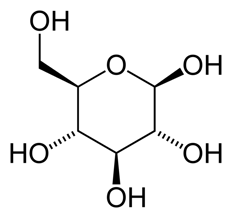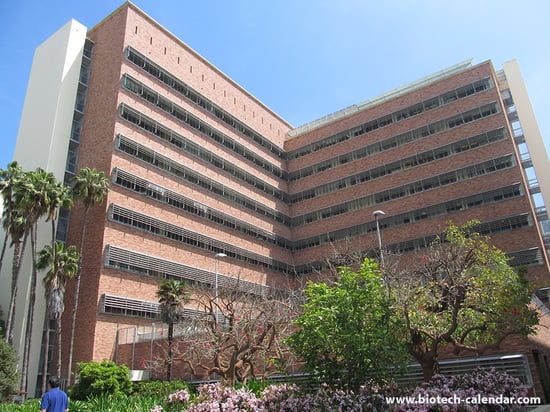
A team of biochemists at UCLA have created a novel system of converting glucose into highly useful chemical compounds, such as those needed to create biofuels and pharmaceuticals. Previous research endeavors relied on using cells to convert sugar into desired compounds. This has been difficult to achieve because cells would rather use sugar for their own natural uses, such as building proteins and cell walls. The UCLA biochemists have recently developed a way to achieve the conversion of glucose into desired compounds- without using cells.
The research team, led by chemistry and biochemistry professor James Bowie, Ph.D., used an approach they call Synthetic Biochemistry that is able to convert sugar into many different chemical compounds without using the help of a cell. They were able to create particular chemical reactions by re-engineering enzymes to function in desired specific ways. (Image of Beta-D-Glucose courtesy of Benjah-bmm27 via Wikimedia Commons)
“The idea of synthetic biology is to redesign cells so they will take sugar and run it through a series of chemical steps to convert it into to a biofuel or a commodity chemical or a pharmaceutical,” explained Dr. Bowie. “However, that’s extremely difficult to do. The cell protests. It will take the sugar and do other things with it that you don’t want, like build cell walls, proteins and RNA molecules. The cell fights us the whole way.”
For their current approach, the UCLA team took two dozen enzymes from different combinations and concentrations and added them to a flask with glucose. Through this work in the flasks, the team was able to create enzymes and pathways that are not naturally occurring. The construction of these enzyme systems shows that the cell is not needed and biochemists have the ability to produce chemical compounds inside the lab.
“We want to do a particular set of chemical transformations — that’s all we want — so we decided to throw away the cells and just build the biochemical steps in a flask. We eliminate the annoying cell altogether,” explained Dr. Bowie.
Through more work, this process could be fine-tuned to successfully produce new products for industrial use, biofuels, and pharmaceuticals.
This study was published in April 2016 in the journal Nature Chemical Biology.
 (Image courtesy of Biotechnology Calendar, Inc.)
(Image courtesy of Biotechnology Calendar, Inc.)
|
RELATED NEWS: UCLA Receives $7.6M for Research on Tumor Eradicating Skin Cells |
The University of California, Los Angeles is a leading institution in terms of the amount of funding it receives annually and the research it produces. In the 2015 fiscal year, the university received more than $370.7 million in funding from the National Institutes of Health (NIH). This funding will greatly benefit multiple research projects and new building constructions across the campus. Departments receiving substantial amounts of this funding include:
- Internal Medicine/Medicine - $102.8 million
- Neurology - $18.05 million
- Physiology - $16.8 million
- Biochemistry -$16.6 million
- Radiation-Diagnostic/Oncology - $13.5 million
With all this funding, researchers at the University of California, Los Angeles have the means to purchase many new lab products that will help with their studies and clinical trials. Biotechnology Calendar, Inc.produces an annual Biotechnology Vendor Showcase™ Event in LA that is a great opportunity to market lab products to active life science researchers at the university. This annual event brings active researchers together with scientific supply companies, so that the researchers can find the best and newest products and technologies to further their work.
The 38th Semiannual Biotechnology Vendor Showcase™ Event at UCLA will be held on October 20, 2016, where more than 200 life scientists are expected to attend. Last year, researchers came from 46 different research buildings and 80 on-campus departments.
To learn more about participating in this popular event, visit the link below:
Researchers in Los Angeles are encouraged to attend this complimentary event. To learn more and pre-register, please visit the following link:



